Brain Diet: 7 Foods Against Dementia and Cognitive Decline
Brain Diet: 7 Foods That Protect Your Memory and Prevent Cognitive Decline and Dementia. Experts Reveal Key Habits in Midlife....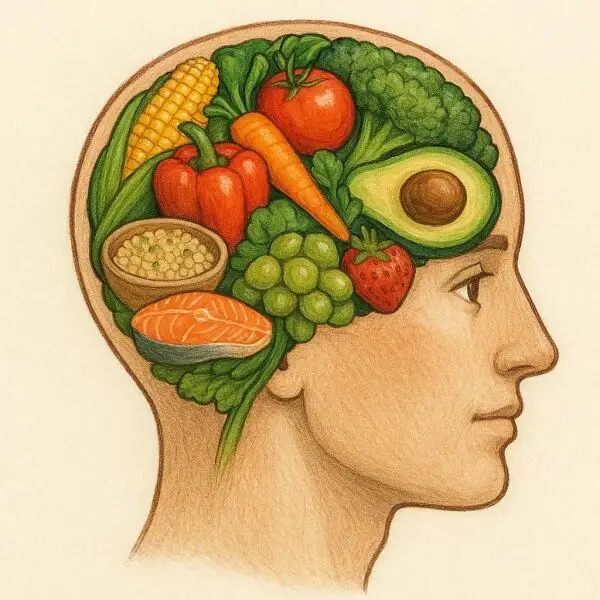
Table of Contents
- World Food Day: the best time to take care of your brain is today
- Nutritional keys that shield neurons
- What to put on the plate? Practical and realistic guide
- Beyond the plate: habits that boost your brain nutrition
Follow Patricia Alegsa on Pinterest!
World Food Day: the best time to take care of your brain is today
Have you ever wondered what your brain will be eating 30 years from now? Yes, you read that right. Middle age is the golden window to plant the seeds for clearer, sharper mental aging with a fresh memory. 🌱🧠
- More than 55 million people worldwide live with dementia.
- There is no cure, but there is room for action. The Lancet Commission 2024 estimates that we can prevent up to 45% of cases if we tackle risk factors and improve lifestyle.
Key difference: mild cognitive impairment is that “in-between” stage between normal age-related forgetfulness and dementia. There’s still much to be done at this stage!
- Small sustained changes make remarkable differences in focus, mood, and working memory.
- Remember: neurons don’t live on donuts (although sometimes they try) 😉.
Nutritional keys that shield neurons
There is no magic diet, but there is a dietary pattern that pampers the brain.
- MIND Diet: Combines the best of the Mediterranean and the DASH diets.
- Good fats (omega-3, olive oil, avocado, nuts) + antioxidants from fruits and vegetables.
- Less inflammation and healthier blood vessels, two pieces of news your brain celebrates.
Fact: A study from Yonsei University (131,209 adults aged 40 to 69) showed that following healthy patterns reduces dementia risk by between 21% and 28%.
Key patterns:
- Prioritize: whole grains, legumes, vegetables, fruits, fish, nuts, and poultry.
- Avoid: fried foods, red or processed meats, ultra-processed foods, and excessive full-fat dairy.
Did you know the brain mainly uses glucose? Its glycogen “batteries” help stabilize spikes and drops.
- The best strategy: give it quality carbohydrates that release energy slowly:
- Legumes: lentils, beans, chickpeas.
- Whole grains: oats, quinoa, brown rice, 100% whole wheat bread.
- Avoid white flours, cookies, and pastries.
- Fatty fish: salmon, mackerel, sardines, anchovies (2 to 3 times per week).
- Seeds of chia and flax, walnuts. Tip: toast and grind the seeds to better absorb the fatty acids.
Antioxidants: the shields of your neurons
- Intense colors on your plate: red berries, purple grapes, citrus fruits, spinach, broccoli, tomato.
- Spices and extras: turmeric with pepper, dark cocoa, green tea, extra virgin olive oil.
Shall we play the “rainbow” game? How many natural colors does your plate have today? If the answer is “beige,” your brain is asking for help.
How to give your brain a break from so many social networks
What to put on the plate? Practical and realistic guide
I share simple ideas I see working in my practice, especially for those living at the pace of WhatsApp and endless meetings:
- A breakfast that sparks neurons:
- Cooked oats with natural yogurt, red berries, and walnuts.
- Whole wheat toast with avocado, tomato, and egg. Coffee or tea without excess sugar.
- A lunch that doesn’t make you sleepy:
- Warm salad of quinoa, chickpeas, spinach, broccoli, bell pepper, olive oil, and lemon.
- Mackerel or sardine fillet with baked potatoes and green salad.
- A sustaining snack:
- Fruit + a handful of almonds or walnuts.
- Kefir or natural yogurt with chia seeds.
- A light and complete dinner:
- Baked salmon with roasted vegetables and brown rice.
- Black bean tacos with pico de gallo and purple cabbage.
- “Anti-fog” snacks:
- Carrots with hummus.
- A small square of 70% cocoa chocolate.
Recommended frequency:
- Legumes: 3-4 times per week.
- Blue fish: 2-3 times per week.
- Nuts/seeds: a handful daily.
- Vegetables: 2-3 servings daily (half the plate).
- Fruit: 2 servings daily, ideally one red fruit.
For your heart, brain, and cholesterol it’s advisable to:
- Reduce: cold cuts, frequent red meats, fried foods, pastries, butter, very fatty cheeses, sugary drinks, and excessive alcohol.
- Increase: fiber (oats, legumes, whole grains), unsaturated fats (olive oil, avocado, nuts), fish, varied fruits and vegetables.
Dare to make a small change? Mariela, 54 years old, swapped white bread for whole wheat, added 2 servings of legumes weekly and canned sardines in water. By week 3 she said: “Patricia, the four o’clock slump stopped hitting me.” Wouldn’t you like to feel that energy and focus?
Beyond the plate: habits that boost your brain nutrition
- Movement: 150 minutes per week of aerobic activity + 2 strength sessions. Muscle helps manage glucose and irrigates the brain. 🚴♀️
- Sleep: 7-8 hours. Sleeping consolidates memories. If you snore loudly or wake up tired, check for apnea. Related:How to improve sleep hours.
- Stress: Practice the 4-7-8 breathing technique, take active breaks and short walks. Chronic cortisol sabotages memory.
- Connections: Talk, laugh, dance. Social interaction is cognitive exercise.
- Ears and eyes: If you don’t hear or see well, the brain overloads. Use hearing aids or glasses when needed.
- Medical check-up: Check blood pressure, glucose, lipids, thyroid, vitamin D and B12. Silent deficiencies affect attention and mood!
- Gut-brain: Incorporate fermented foods (kefir, natural yogurt, sauerkraut) and prebiotic fiber (banana, oats, legumes, onion).
- Alcohol: If you drink, keep it little and occasional. “A lot but only on weekends” also harms. Keep reading:Benefits of quitting alcohol.
- Coffee and tea: In moderation they help attention due to their polyphenols. Avoid drinking them too late.
- Supplements: They are not magic wands. First prioritize real food; use supplements only if a professional recommends them.
Ready to commit to your brain? Do this small exercise:
- Choose three changes to start this week. Write them down and stick them on the fridge.
- Swap one red meat dinner for legumes.
- Add one daily serving of leafy greens.
- Cary a real snack (fruit + nuts) in your bag.
If you want, share your routine with me and we’ll create a simple and sustainable MIND plan together.
Dare to take care today of the brain of the future? Your future self will thank you greatly.
Subscribe to the free weekly horoscope
Aquarius Aries Cancer Capricorn Gemini Leo Libra Pisces Sagittarius Scorpio Taurus Virgo
-
 Sleeping on a fixed schedule cuts the risk of death in half
Sleeping on a fixed schedule cuts the risk of death in half
Sleeping at regular hours nearly cuts your risk of death in half. Better routine, better life—your circadian rhythm will thank you. Have you tried it yet? -
 How to Prevent Diabetes: Tips for Controlling Blood Sugar
How to Prevent Diabetes: Tips for Controlling Blood Sugar
Discover how to manage diabetes, one of the most common chronic diseases. Learn to prevent nighttime sugar fluctuations and live fully. -
 The German technique to sleep better and reduce stress in minutes: Lüften
The German technique to sleep better and reduce stress in minutes: Lüften
Discover Lüften, the German habit that reduces stress in minutes, boosts your mood, and prepares you for deep sleep. Breathe, renew, and rest, according to GQ. -
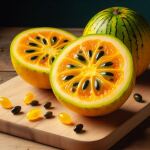 The citrus fruit that combats insomnia and improves your sleep
The citrus fruit that combats insomnia and improves your sleep
Discover the citrus fruit that combats insomnia with its sedative properties. Improve your sleep, reduce stress, and provide essential vitamins. -
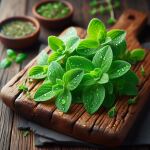 The Mediterranean spice that improves your health
The Mediterranean spice that improves your health
Discover this essential spice of Mediterranean cuisine, rich in beneficial compounds. Easily incorporate it into your daily diet and improve your health!
I am Patricia Alegsa
I have been writing horoscope and self-help articles professionally for over 20 years.
Subscribe to the free weekly horoscope
Receive weekly in your email the horoscope and our new articles on love, family, work, dreams and more news. We do NOT send spam.
Astral and numerological analysis
-
 Discover your future, secret personality traits and how to improve in love, business and life in general
Discover your future, secret personality traits and how to improve in love, business and life in general
-
 Online Dream Interpreter: with artificial intelligence
Do you want to know what a dream you had means? Discover the power of understanding your dreams with our advanced online dream interpreter using artificial intelligence that responds to you in seconds.
Online Dream Interpreter: with artificial intelligence
Do you want to know what a dream you had means? Discover the power of understanding your dreams with our advanced online dream interpreter using artificial intelligence that responds to you in seconds.
-
 Tired and out of energy? The 5-step method to detox and renew yourself
Tired and out of energy? The 5-step method to detox and renew yourself
Out of energy? Gary Brecka shares 5 steps for a natural detox and recharging your batteries on his podcast Ultimate Human. Ready to renew yourself? -
 I wake up at 3 am and I can't go back to sleep, what should I do?
I wake up at 3 am and I can't go back to sleep, what should I do?
Can't fall back asleep after waking up at 2, 3 or 4 am? Here's how to solve this distressing sleep problem. -
 Boost Your Mind! 13 Scientific Tricks to Improve Your Focus
Boost Your Mind! 13 Scientific Tricks to Improve Your Focus
Discover 13 scientific ways to boost your mind! Better concentration and agility: sleep well, stay hydrated, and create a noise-free space. -
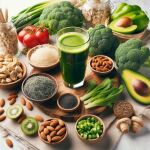 Fiber: Key nutrient to keep you healthy
Fiber: Key nutrient to keep you healthy
Discover the key nutrient that improves digestion, strengthens the immune system, and protects mental health, essential for preventing chronic diseases and living healthily. -
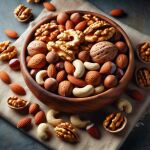 Do you include too many nuts in your diet?
Do you include too many nuts in your diet?
Discover how including these foods in your daily diet can improve your well-being and help prevent common diseases. Transform your health today! -
 How Stress Affects Your Blood Pressure: Tips
How Stress Affects Your Blood Pressure: Tips
Discover how stress affects blood pressure and how managing daily tension can improve heart health. Expert tips included. -
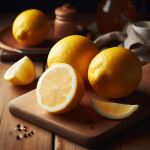 The wonders of lemon for your health, to absorb iron and improve your weight
The wonders of lemon for your health, to absorb iron and improve your weight
Discover how the fruit improves iron absorption, prevents kidney stones, and is key for losing weight in a healthy way. Start enjoying it! -
 What does it mean to dream of forests?
What does it mean to dream of forests?
Discover the fascinating world of forest dream interpretation. What messages do your dreams hide? Explore their meaning in our latest article. -
 What does it mean to dream of fruits?
What does it mean to dream of fruits?
Discover the mysterious meaning behind dreaming about fruits. What message is your subconscious sending you? Read our article and find out! -
 Discover a note from 1825 in an ancient time capsule
Discover a note from 1825 in an ancient time capsule
Discover a 200-year-old time capsule in Bracquemont with a message from an archaeologist. A magical find from the Gallic era! -
 What does it mean to dream of chimneys?
What does it mean to dream of chimneys?
Discover the meaning of dreaming about fireplaces in this article. Does it represent the warmth of home or a need to escape? Find answers here. -
 10 Foolproof Tips to Improve Your Mood, Boost Your Energy, and Feel Amazing
10 Foolproof Tips to Improve Your Mood, Boost Your Energy, and Feel Amazing
Discover how to lift your mood and fill yourself with positive energy, even on the grayest days. Find the key to improving your well-being and enjoying a fuller, happier life—don’t wait any longer to change your mood! -
 The dangerous path of plastic surgery: aging with dignity
The dangerous path of plastic surgery: aging with dignity
Why the obsession with youth can turn famous faces like Zac Efron's into examples of bad plastic surgery. Learn to age with dignity. Don't miss it!